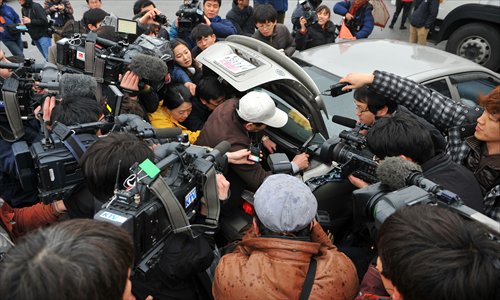Flee S.Korea now, NK urges

The tension on the Korean Peninsula further escalated Tuesday after North Korea urged all foreigners in South Korea to evacuate, saying the region is on the brink of a "thermonuclear war."
Analysts dismissed the possibility of an imminent war on the Korean Peninsula, noting that the warning is the latest in a series of threats issued by Pyongyang to bluff the US and South Korea into making concessions on the nuclear issue.
"The situation on the peninsula is inching close to a thermonuclear war" due to the hostile actions of the US and South Korea, North Korea's official KCNA news agency quoted a spokesperson for the country's Korea Asia-Pacific Peace Committee as saying.
"The committee informs all foreign institutions and enterprises and foreigners, including tourists that they are requested to take measures for shelter and evacuation in advance for their safety," the spokesman said, stressing that North Korea "does not want to see foreigners in South Korea fall victim to the war."
China said Tuesday it did not want to see chaos on the peninsula and opposes any side taking steps to worsen the situation.
"We want peace, not war; dialogue, not confrontation; easing, not tension," Chinese foreign ministry spokesman Hong Lei told reporters at a daily news briefing, urging all parties concerned to push forward the resumption of the Six-Party Talks.
Cai Jian, deputy director of the Center for Korean Studies at China's Fudan University, told the Global Times that it is unlikely a large-scale military conflict will break out because North Korea's threats are largely just psychological warfare against the US and South Korea.
"Pyongyang believes that by gradually trying to push the envelope, it will be able to finally force Seoul and Washington to soften their stance due to their fear of a war," Cai noted.
But in Seoul, South Korean Foreign Minister Yun Byung-se said Pyongyang will face deeper isolation if it carries out more provocations.
"North Korea must understand that there is nothing, absolutely nothing, to be gained by threats and provocations," Yun said, according to South Korea's Yonhap news agency.
North Korea's Tuesday warning to expatriates in South Korea came after it on Friday advised foreign embassies to pull their staff out of Pyongyang by April 10 in case a war breaks out in the region.
On Monday, North Korea also decided to suspend the operation of the last remaining Kaesong industrial zone with the South and recall all of its 53,000 workers.
South Korean President Park Geun-hye said Tuesday the suspension of the industrial park was "very disappointing."
"There were initially expectations that under the new administration of Park, inter-Korean ties would improve as Park has a relatively practical stance toward the North, but Pyongyang's provocations have ruined these prospects," Shi Yinhong, a professor with the School of International Studies at the Renmin University of China, told the Global Times.
There has been speculation that North Korea will conduct a missile or nuclear test this week, possibly to coincide with April 15 celebrations for the birthday of the nation's late founder Kim Il-sung.
Citing South Korean government officials, Yonhap reported Tuesday that North Korea has already completed preparations for a mid-range missile launch from its east coast.
Japan on Tuesday deployed a Patriot Advanced Capability-3 missile interceptor unit around Tokyo to prepare for any possible ballistic missile tests by North Korea.
Japanese defense minister Itsunori Onodera has reportedly been given the authority to order Japan's Self-Defense Forces to shoot down any ballistic missile launched by North Korea should they enter Japan's air space.
"It is one thing for North Korea to test-fire its missiles, but it would be totally different if they target US military bases in South Korea or Japan with the possible launch, because this would cross the bottom line of nations in the area and plunge the whole region into a much larger crisis," Shi warned.
Agencies contributed to this story